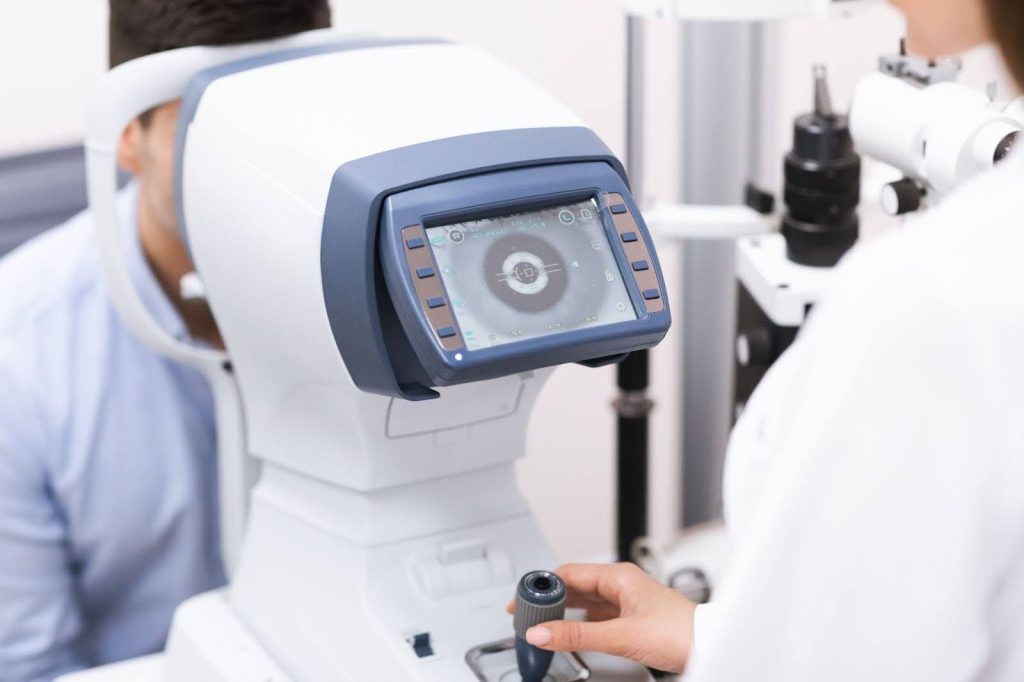Comprehensive eye examinations are a routine part of maintaining visual health, but did you know they can also play a possible role in detecting various underlying health conditions? Many people may need to realise that these examinations have a more profound and far-reaching impact on their overall health. Aside from checking visual acuity, eye exams can uncover various underlying health conditions.
With this, we give you insight into the conditions you may detect during an eye exam.
1. High Blood Pressure
High blood pressure, also known as hypertension, is a prevalent but often silent health issue. Without noticeable symptoms, it can quietly damage your arteries, heart, and other organs over time. Fortunately, during a routine eye test, your ophthalmologist may be able to offer vital insights into your cardiovascular health and identify any underlying health issues.
The retina, located at the back of your eye, contains a complex network of blood vessels. The eye doctor will closely examine these tiny vessels when you undergo an eye test to detect if there are any issues. Changes such as narrowing, twisting, or even tiny spots on the retinal blood vessels can indicate high blood pressure.
Detecting these signs early can be a game-changer for your health, as it allows for prompt intervention through lifestyle changes or medication, reducing the risk of stroke, heart disease and other conditions associated with hypertension.
2. Stroke Risk
Your eye health is intricately connected to your circulatory system, and abnormalities in the blood vessels of the retina can be a potential red flag for stroke risk. Although the signs may be subtle, they can be crucial in assessing your overall health. Early detection through an eye test can lead to further evaluation and preventive measures, potentially reducing your vulnerability to a stroke.
3. Cataracts
Cataracts can provide valuable insights into your overall well-being. A cataract is the clouding of the eye’s natural lens, leading to blurred vision. However, it’s more than just a vision issue; it can be a sign of other health concerns. During a comprehensive eye test, the medical professional can detect cataracts in their early stages. Addressing them promptly not only improves your vision but also contributes to your overall quality of life. In some cases, cataracts can be linked to lifestyle factors like smoking or certain medications, and addressing these factors can have a positive impact on your health.
4. Glaucoma
Glaucoma is a condition that can cause irreversible blindness if left untreated. It is characterised by increased intraocular pressure, which can damage the optic nerve. However, when you undergo an eye test, the eye doctor can detect if there is damage to the optic nerve. They can measure your intraocular pressure and evaluate the health of your optic nerve. Early detection of glaucoma through regular eye exams is critical for effective management and the preservation of your vision. Learn more about glaucoma and its treatment options.

5. Dry Eyes
Dry eyes are a common condition that can result from various factors, including environmental conditions, ageing, and systemic health conditions. An eye test can assess the health of your tear film and identify potential causes of dry eyes. Detecting and addressing the underlying causes of dry eyes is not only essential for your eye comfort but can also contribute to your overall health. It’s important to work with your eye doctor to identify the cause of your condition and develop a treatment plan that addresses any systemic health issues that contribute to your dry eye symptoms.
6. Presbyopia
Often considered a natural part of ageing, presbyopia can affect your ability to focus on close objects. While it is common as you get older, it can also be an early indicator of other eye conditions or underlying health issues. With an eye test, the doctor can evaluate your ability to focus on objects at different distances and detect presbyopia along with associated concerns. Understanding the presence of presbyopia can prompt further evaluation of your eye health and overall well-being.
7. Diabetes and Diabetic Retinopathy
Diabetes is a complex metabolic condition that can have profound implications for eye health. Elevated blood sugar levels over time can result in diabetic retinopathy, a serious eye disease that affects the blood vessels in the retina. Diabetic retinopathy progresses in stages, and early detection through regular comprehensive eye exams is paramount for effective management.
During a diabetic eye screening, the eye doctor will closely examine the retina for signs of diabetic retinopathy. These signs may include microaneurysms, haemorrhages, and swelling of retinal blood vessels. Detecting these changes in their early stages allows for timely intervention to prevent vision loss.
8. Medication Toxicities
Certain medications, especially when taken over extended periods, can have adverse effects on your eyes. These effects can vary widely, from dry eyes and blurred vision to more severe conditions such as retinal toxicity. Routine eye tests are valuable in detecting medication-related toxicities or side effects, enabling healthcare providers to make necessary adjustments to your treatment plan.
For example, medications such as hydroxychloroquine, commonly used for the treatment of autoimmune diseases like lupus and rheumatoid arthritis, can have potential retinal toxicity. In its early stages, patients are asymptomatic. However, with comprehensive eye exams, eye doctors can monitor the health of the retina and detect any signs of toxicity. If detected early, adjustments in medication dosage or alternative treatments can be explored to protect your ocular health.
9. Rheumatoid Arthritis and Ocular Manifestations
Rheumatoid arthritis is an autoimmune disorder characterised by inflammation and joint pain. What many people may not be aware of is that rheumatoid arthritis can also affect the eyes, leading to a range of ocular manifestations.
Common ocular symptoms associated with rheumatoid arthritis include dry eyes, eye inflammation (uveitis), and scleritis (inflammation of the white part of the eye). These eye conditions can be painful and, if left untreated, may result in vision impairment.
During a routine eye test, doctors can detect early signs of these ocular complications. Timely identification is crucial because prompt treatment can help alleviate discomfort and prevent long-term vision problems. Coordination with a rheumatologist is often necessary to manage both the systemic and ocular aspects of rheumatoid arthritis effectively.
10. Thyroid Disease and Ocular Manifestations
Thyroid disorders, including hyperthyroidism (overactive thyroid) and hypothyroidism (underactive thyroid), can have notable effects on the eyes. Ocular manifestations associated with thyroid disease may include:
- Bulging Eyes (Proptosis): Hyperthyroidism, particularly in the form of Graves’ disease, can lead to an autoimmune reaction that affects the tissues around the eyes. This can cause the eyes to bulge forward, a condition known as proptosis or exophthalmos. Comprehensive eye exams can help monitor the progression of proptosis and assess its impact on vision.
- Dry Eyes: Both hyperthyroidism and hypothyroidism can result in dry eye syndrome, causing discomfort and vision problems.
- Other Eye Changes: Thyroid eye disease can also lead to eye redness, double vision, and changes in eye alignment. Detecting these ocular manifestations during an eye exam can prompt further evaluation and coordination with an endocrinologist for thyroid disease management.
The Importance of a Comprehensive Eye Exam in Singapore
With all these conditions that can be detected through an eye exam, scheduling for one yearly is paramount. That’s why make sure to meet with a trusted eye specialist clinic in Singapore for a comprehensive eye screening and test so that you can stay on top of your eye health and overall health.

Dr. Christopher Khng, specializes in Complex Cataract and Anterior Segment Reconstruction Surgery, in particular, Iris Reconstruction and surgery for Aniridia. His other areas of expertise include Complex Lens surgery, New Lens and Phacoemulsification technologies, Refractive surgery, Phakic IOLs (the Implantable Collamer Lens, ICL), and small-incision, topical anesthesia phacoemulsification cataract surgery. Dr. Khng is a member of the Singapore Medical Association (SMA), a Fellow of the American Academy of Ophthalmology, the American Society of Cataract and Refractive Surgery (ASCRS), and the European Society of Cataract and Refractive Surgery (ECSRS). He is registered with the Singapore Medical Council (SMC) in Singapore and with the General Medical Council (GMC) for practice in the United Kingdom.

